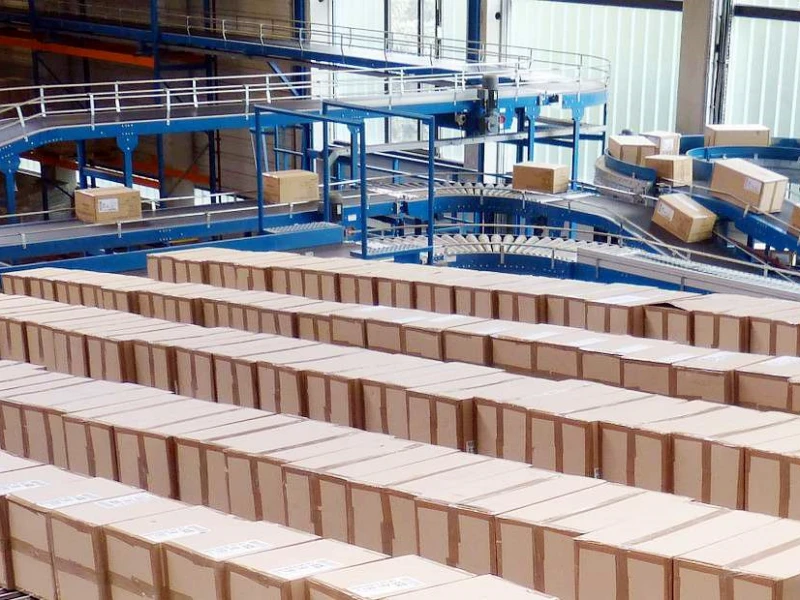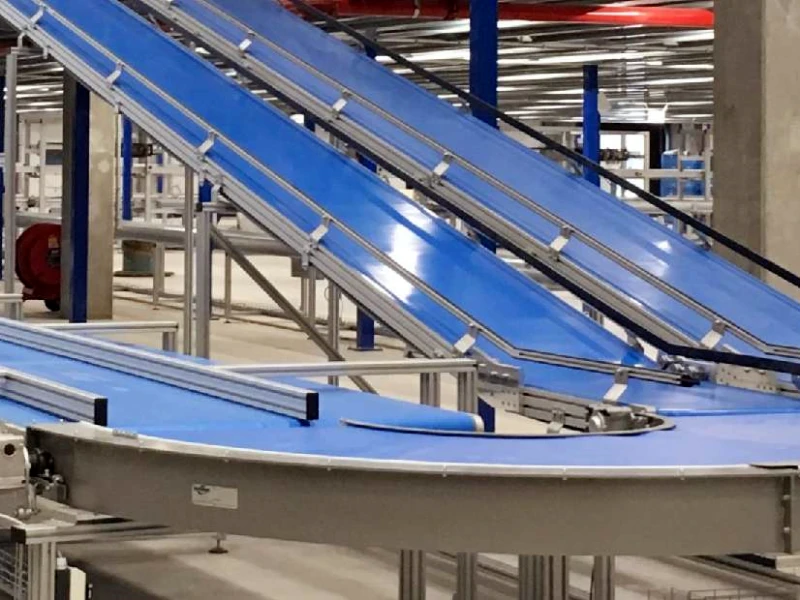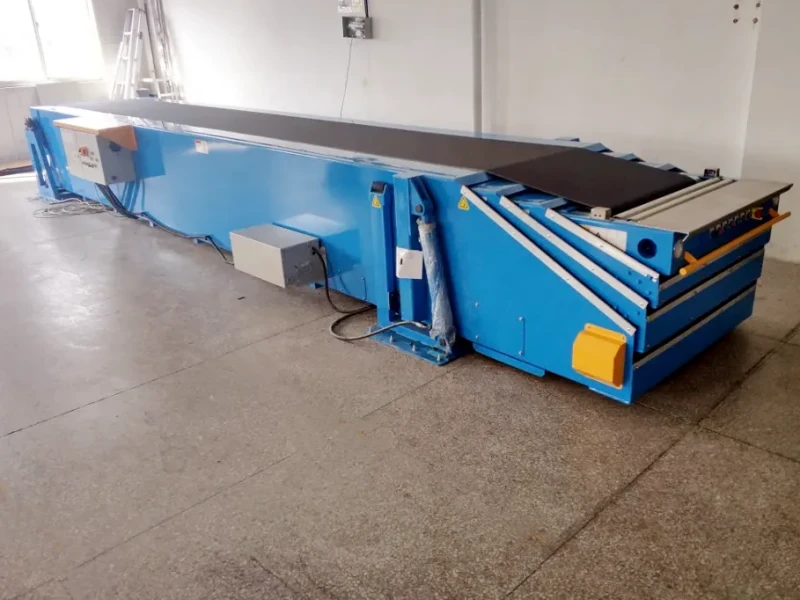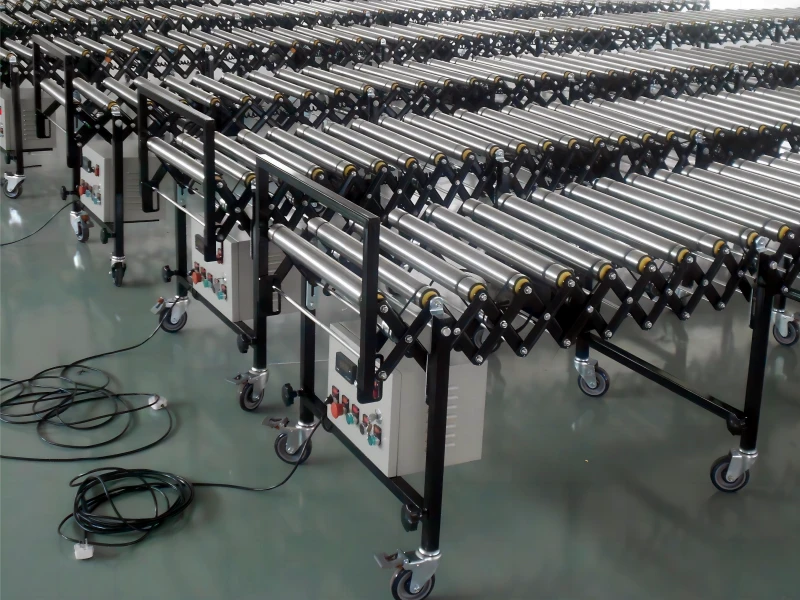
Logistic Belt Conveyor and Roller Conveyor System
Conveyors play a crucial role as material handling and transportation equipment in the logistics industry. They significantly improve operational efficiency and reduce costs. This article explores the application of belt conveyors and roller conveyors in express logistics, large-scale warehousing, and production lines, highlighting their advantages in logistics automation and potential future developments.
1. Sorting Systems in Express Logistics
In the rapidly growing e-commerce industry, the efficiency of sorting processes in express logistics is critical to improving delivery speed. Traditional manual sorting methods are inefficient and prone to errors, while automated sorting systems powered by conveyors significantly enhance both efficiency and accuracy.
For example, in an e-commerce logistics center, a high-speed conveyor system was implemented for parcel sorting:
- Parcels are scanned automatically to retrieve order information.
- The conveyor distributes parcels to designated exits based on their destinations.
- Optimized algorithms and coordinated equipment operations ensure fast and accurate sorting.
- Increase efficiency in loading and unloading containers with telescopic belt conveyors in docks.
This approach greatly reduces sorting time, minimizes manual intervention, and boosts the logistics center's processing capacity.

This is a belt conveyor system for logistic.
2. Material Handling in Large-Scale Warehousing
Material handling in large-scale warehousing often involves repetitive, time-consuming tasks. By implementing conveyor systems for automated material handling, efficiency can be significantly improved while reducing labor costs.
A large logistics center serves as an example, where a fully automated conveyor system was deployed:
- Conveyor Layout: Lines were set up to connect procurement zones, storage areas, and sorting zones.
- Material Handling Process: Roller conveyors and drive mechanisms enable seamless and continuous material transportation. The flexible roller conveyors are also widely used in material handling.
- Optimized Design and Control: Properly designed conveyor paths ensure smooth material flow, reducing blockages or pile-ups.
This system dramatically enhances warehouse automation, enabling the efficient handling and accurate distribution of large quantities of materials.
3. Material Supply and Assembly in Production Lines
In the manufacturing sector, material supply and assembly line operations are critical processes. Traditional manual material supply methods are inefficient and error-prone. Conveyor systems, however, enable automated material supply and coordinated operations, improving both efficiency and quality.
For instance, an automotive manufacturing plant adopted a conveyor system for automated component supply:
- Accurate Material Supply: Components are transported from storage areas to specific assembly line stations.
- Collaborative Operations: The conveyor system works with robots to perform automated picking and assembly tasks.
- Reduced Waiting Time: Optimized material supply processes minimize waiting times between workstations, ensuring continuous and stable assembly operations.
This system not only increases production efficiency but also reduces human error, ensuring high product quality.

This is a telescopic belt conveyor system.
4. Future Development Trends of Conveyor Systems
1. Intelligent and Adaptive Systems
With increasing logistics demands, conveyor systems will become more intelligent by incorporating technologies like artificial intelligence and machine learning to:
- Automatically adjust speed, routes, and operational modes based on material types and task requirements.
- Achieve more flexible and efficient material handling, enhancing overall accuracy.
2. Integration with IoT and Warehouse Management
Deep integration with warehouse management systems (WMS) and IoT technologies enables:
- Real-time monitoring of inventory and warehouse conditions to optimize goods allocation.
- Improved precision in inventory management, further enhancing warehousing efficiency.
3. Energy Efficiency and Environmental Sustainability
To support sustainable development, conveyor systems will focus on:
- Utilizing efficient power transmission technologies to reduce energy consumption.
- Adopting energy-saving control systems to minimize carbon emissions and promote green logistics.

These are powered flexible roller conveyor systems in our factory.
The application of conveyor systems in the logistics industry demonstrates their immense potential in enhancing efficiency and reducing costs. From automated sorting in express logistics to material handling in large-scale warehousing and precise material supply in production lines, conveyor systems have become essential tools for logistics automation.
Looking ahead, with continued advancements in intelligent and energy-efficient technologies, conveyor systems will play an even more significant role in the logistics industry, providing robust support for modern logistics development and innovation.


Leave Me Your Requirement!